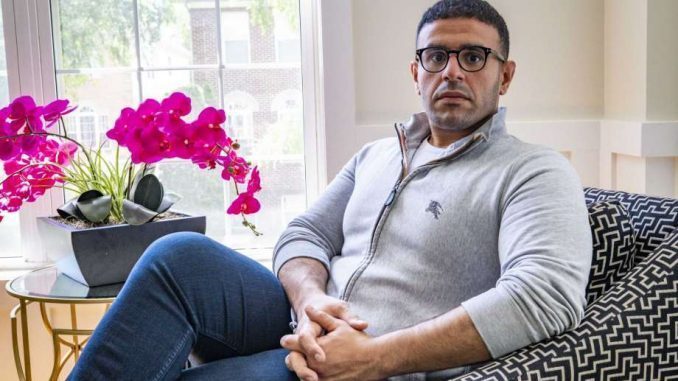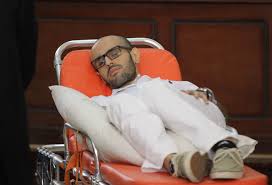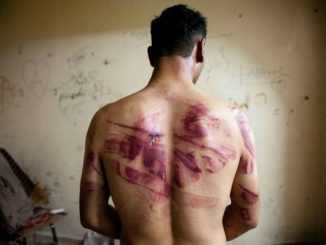
Mohamed Soltan, a U.S. citizen, and former high-profile Egyptian political prisoner has reportedly filed a lawsuit against Egypt’s ex-prime minister for being exposed to torture during detention in Egypt’s prisons.
Mohamed Soltan filed a federal lawsuit on Monday asserting that he was shot, beaten and tortured over 643 days of imprisonment by Cairo’s military regime to crush dissent and reporting by journalists, according to a report by Spencer S. Hsu, published in the Washington Post.
Mohamed Soltan, 32, an Egyptian-American raised mostly in the American Midwest, filed suit in U.S. District Court in the District of Columbia alleging he was “targeted” for assassination and “barbaric” abuse over more than 21 months in prison because he “dared to expose to the world the Egyptian military government’s” suppression of Islamist and liberal dissidents that led to massacres in Cairo in August 2013.

A 46-page complaint names as a defendant former interim prime minister Hazem el-Beblawi, asserting that he directed and monitored the treatment of Soltan, an Ohio State University economics graduate who lived Cairo for five months and worked with protesters after the military-led ouster of Egypt’s former president Mohamed Morsi.
Soltan’s suit seeks “justice and accountability” under a 1991 U.S. law that permits torture survivors to seek damages from their tormentors under certian circumstances. The lawsuit also names as “unsued-defendants” Egyptian President Abdel Fatah al-Sissi, former Sissi chief of staff and now Egyptian intelligence chief Abbas Kamel, and three former top interior and security ministry leaders, saying they could be served if they travel to the United States.
Foreign governments and leaders are typically immune from civil suits in U.S. courts. However, the Torture Victim Protection Act allows suits against those allegedly liable for torture or inhumane treatment anywhere in the world if they are in the United States and no longer heads of state. In a twist, Beblawi, an 83-year-old politician and Sorbonne-trained economist, serves on the executive board of the International Monetary Fund in downtown Washington, three blocks from the White House, and lives in McLean, Va., just miles from Soltan, putting him under federal court jurisdiction.
Soltan lives in neighboring Fairfax, studies at Georgetown University and works as a human rights advocate for his foundation in Washington.
“It’s unusual to think that in this day and age in the United States, you could have a scene out of another country and another time, where a torturer and a victim could pass by each other in the street,” Soltan attorney Eric L. Lewis said. “That means Mr. el-Beblawi is amenable to U.S. justice, and that’s what this case is about.”
Beblawi did not immediately respond Monday to a request through the IMF, nor did the Egyptian embassy in Washington, D.C.
Soltan was shot in the bloody crackdown by security forces authorized by Beblawi’s cabinet after a military coup ousted Morsi and his Muslim Brotherhood backers. The brutal sweep of opponents culminated in the mass shooting deaths of nearly one thousand people on Aug. 14, 2013, and the arrest of tens of thousands of political prisoners including activists, journalists and political opponents.
Soltan was shot that day and arrested later with three journalists at his family’s home by police looking for his father, a Muslim Brotherhood member and former Morsi deputy minister. Soltan was later held within earshot of his father’s beatings, who remains in prison.
The younger Soltan, who is not a member of the brotherhood, was deported on May 30, 2015, after relinquishing his Egyptian citizenship and following Obama administration criticism of his prosecution and appeals for his humanitarian release.
“You don’t get to fully put back the pieces of your life after a horrendous experience like that,” he said in an interview. But Soltan said his father, who knows nothing about the lawsuit, has often sent letters and messages from prison conveying “how extremely proud he is” of their work.
“The fights for human rights, democracy and rule of law are noble fights,” Soltan said.
Soltan was burned, beaten and repeatedly denied treatment for a bullet wound to his arm. His ribs were broken, metal nails that held his bones together began to tear out of his elbow and skin, and screws shifted near his ulnar nerve causing “excruciating pain,” the lawsuit asserted.
“What kind of medical attention would you need once you had a bullet in your head?” an Egyptian security officer asked Soltan, who eventually shed 160 of his original 270 pounds of weight on a 15-month hunger strike in Cairo’s Tora prison complex for political prisoners, the lawsuit said. While there, Soltan suffered a pulmonary embolism and at least 12 hypoglycemic comas, the suit asserted.
At one point, it said, two cellmates, both doctors, used pliers and a razor to operate on him without anesthetics or sterilization to prevent further injury, while others held him down. Guards later allegedly gave him razor blades with instructions to slit his wrists vertically, and on another occasion exposed electrical wires in his cell and told him to “make sure you grab [the wires] with two hands,” the suit alleged.
Legal watchers say the Torture Victim Protection Act, the law cited by Soltan, could become an intriguing deterrent for authoritarian leaders who enjoy impunity at home for abuses committed abroad, and who U.S. foreign policy is reluctant to counter for whatever reasons.
Texas law professor Stephen Vladeck has said “the specter of being served with a TVPA claim while on U.S. soil may well be reason enough for [former leaders] to end such trips,” at least until the law’s 10-year statute of limitations expires.
Vladeck referred to Saudi Crown Prince Mohammed bin Salman, whom the CIA concluded ordered the assassination of Post contributing columnist and Saudi critic Jamal Khashoggi inside the Saudi Consulate in Istanbul in 2018. Khashoggi’s death sparked global outcry but limited legal consequences for senior leaders of the strategically located oil kingdom.
“Today, we send a message to the torturers and human rights abusers of Egypt’s corrupt and brutal regime that they cannot commit crimes against humanity and then seek safe haven in the United States and walk the streets of America’s cities with impunity,” said Lewis, of Lewis Baach Kaufmann Middlemiss.
Lewis added that the IMF’s employment of “a torturer and human rights abuser” of thousands of free speech advocates is “a stain on the organization.”
The IMF had no immediate comment.
Soltan asserts in his lawsuit that Beblawi authorized the Egyptian cabinet and the then-interior minister, to violently disperse the protests. Beblawi later confirmed to Egyptian media that “close to 1,000” deaths resulted, adding, “We expected much more,” the lawsuit said.
Soltan was interrogated by Egypt’s chief of state security prosecutions and singled out for helping foreign media “embarrass Egypt before the world,” for his U.S. citizenship and his father’s status, the suit states.
“They knew who he was,” Lewis said.
Soltan was convicted in a mass trial and sentenced to life in prison after being charged with broadcasting “false news,” spreading “terror,” damaging the state’s prestige and disturbing national and public security.
Since returning to the United States, Soltan has become an advocate for Egyptian prisoners — including five U.S. citizens — arguing that silence by Washington is taken by regimes as consent. He said it is in America’s interest to counter the radicalization of a generation of Egyptian dissidents, who may differ on many fronts but agree on “hatred of the United States” for enabling Sissi.
Amid a bleak landscape of injustice and authoritarianism in 2020, Soltan said of the lawsuit, “It’s sort of a little light in a very, very dark time.”
Soltan is recently married and lives in Fairfax near three of his four siblings. He said he continues to get “calls in the middle in the night” about friends or an uncle arrested; his father punished; and prisoners in cases he is working on — including one who recently died from medical neglect.
He also still bears burn marks on his neck, bullet scars, and limited strength and motion in his left arm.
But worse he said is a “perpetual trauma” that includes nightmares of the inmate who guards put in his cell to die beside him, the screams of other prisoners being beaten, and the torture of his father within earshot.
“Living with this is extremely painful,” Soltan said.
“Having firsthand knowledge of the level of brutality and inhumanity” prisoners face, of having freedom, will and dignity “stripped away from you,” Soltan said, “I have to attempt to get some justice.”
Read the full lawsuit by Mohamed Soltan here



